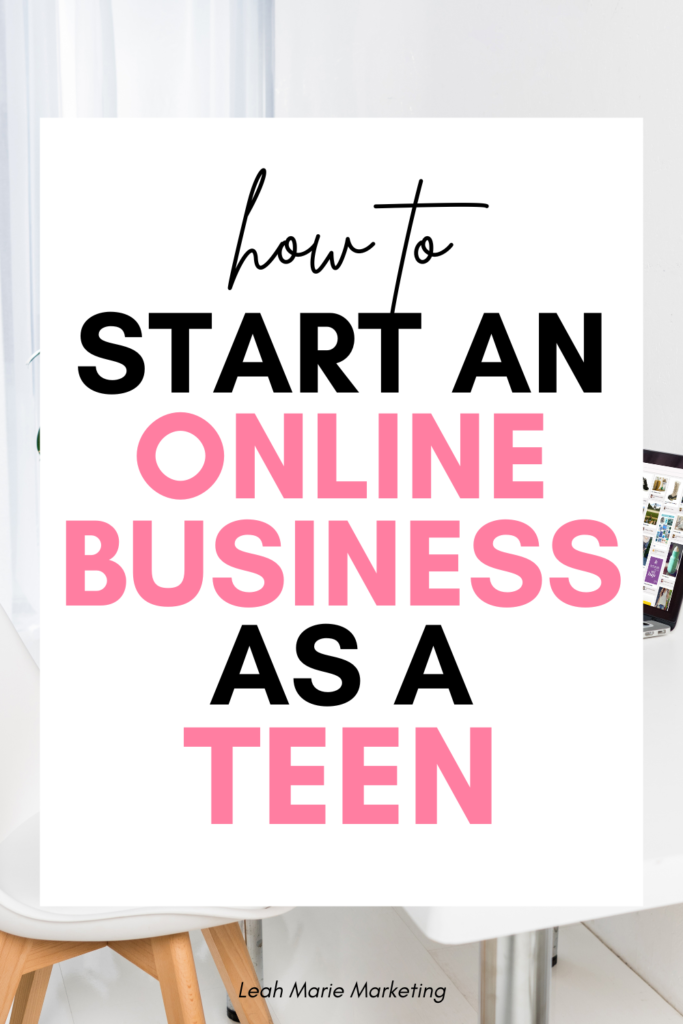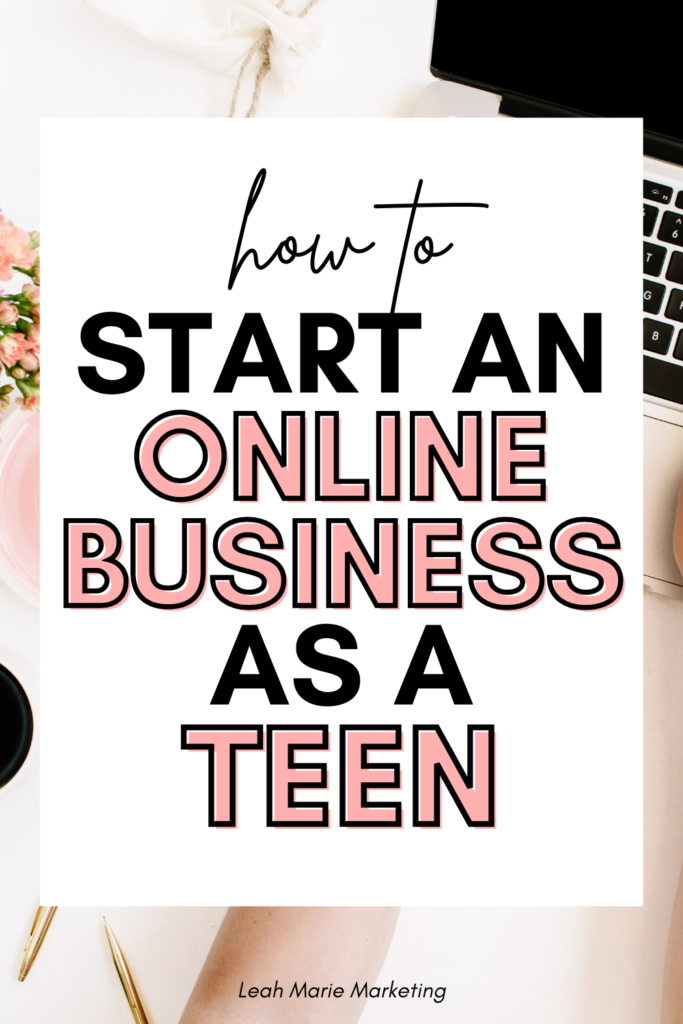
- Can you start an online business as a teenager?
- Why should teens start online small businesses?
- How much money do you need to start online businesses?
- How to start an online business as a teenager
- 1. Think about your “why” and your goals
- 2. Brainstorm business ideas and niches
- 3. Create a business plan and develop a monetization strategy
- 4. Do your research
- 5. Figure out your plans before launch
- 6. Start your online business
- 7. Do marketing for your business
- 8. Invest back into your business when you begin to grow
- 9. Stick to a schedule and stay disciplined
- 10. Never stop learning
- 11. Don’t let imposter syndrome get to you
- Conclusion
Online businesses are a great way to add extra income streams. One of the great things about online businesses is that anyone can start one – even teenagers!
I say this from personal experience! When I began to see the possibilities of starting an online business and even saw people making full-time incomes, I knew I wanted to give it a try myself!
I started my first online business in my early high school years. Although that online business wasn’t a success, I later started another online business going into my senior year of high school with a whole new strategy.
That business – this very blog – is still alive and thriving! And since then, I have started a few more successful online businesses!
In this post, I’m going to share my advice on how to start an online business as a teenager even with limited money, and I’ll even share more about my own experience as well.
Let’s dive in.
Can you start an online business as a teenager?
Yes, you absolutely can start an online business as a teenager. There are so many examples of teens who have successfully started an online business and even grown it into their career.
Why should teens start online small businesses?
There are so many reasons why teens should start an online business. Here are some great reasons why:
- Starting your own business gives you so much real-world experience that you can’t get anywhere else.
- Having your own business requires you to discover, learn, and develop a variety of useful skills.
- Starting a business gives you something to do in your free time and something to work towards.
- Having your own business allows you to be strategic, creative, and a dreamer all in one.
How much money do you need to start online businesses?
You can start an online business with as little as no money! Sure, having money to invest can help you to get your feet off the ground, but it is certainly not necessary. As you begin to see your online business grow, you can think more about investing to further your growth.
When I started my own online businesses, I was very hesitant to invest because (1) I didn’t have much money to invest and (2) I didn’t want to invest in a business that I was unsure of the future of. It’s scary to put your money towards something that might not “pay off” down the road!
If you are a teenager starting an online business on a limited budget, know that you do not need to invest right away to see results. There are so many platforms that you can start on and do marketing with for free (ex. Instagram, TikTok, Pinterest, Etsy, YouTube, etc.).
Have confidence in yourself! You’ve got this!
How to start an online business as a teenager
Here is a simple but detailed framework on how to start an online business as a teen:
1. Think about your “why” and your goals
Planning before actually starting your business is essential because it helps to give you more of a direction.
So before you start, I highly recommend that you think about two things:
(1) Your “why”
Why do you want to start an online business? What’s your reason for doing it? What’s the motivation and drive behind it?
While growing an online source of income can definitely be motivating and a good goal, I caution you if it’s your only reason for starting an online business, as it truly does take a lot of work and often a long time, despite what many online business gurus may portray.
(2) Your goals
What are you hoping to achieve with your business? What are your mini goals and your end goals? What is the “bigger picture”?
Once you understand your “why” and have your goals mapped out, you can now find a business idea and develop a strategy to help you reach those goals!
2. Brainstorm business ideas and niches
Now it’s time to start brainstorming business ideas. What do you want your business to be about?
When you get to this part, there are a few things that I encourage you to think about:
- Think about what you know or what you’re good at. If you have a skill, you can probably monetize it! People will pay to learn skills or to have things done for them that they can’t do themselves. In other words, Think about problems that others have that you know how to solve!
- Things you want to get good at. Say, for example, that you want to be a YouTube video editor but you don’t yet have much experience. This is a skill you can still learn by practicing, and something you can absolutely still monetize. Maybe you start by editing your own YouTube videos or you offer to edit others’ videos for not much profit in the beginning. Once you begin to develop your style and have a portfolio, you can begin to expand and charge more for your services.
- Think about things that you love. You can certainly monetize your passions!
In the online business world, you’ll hear mixed opinions on starting a business based on a passion or starting a business based on a profitable niche. I’m a firm believer that you can make any passion profitable if you have the right strategy and business model.
From my own experience, I highly recommend starting an online business revolving around something that you actually love.
When you aren’t passionate about something, burnout can come a whole lot easier. And you definitely want to avoid that!
3. Create a business plan and develop a monetization strategy
Now that you’ve picked what you want your business to be about, it’s time to think about your business model.
In this phase, you especially want to think about how you can financially profit from your business.
Think about your business idea. How can you monetize it?
There are nearly endless business models that can make you money online. Here are some ideas:
- Blogger
- YouTuber
- Digital product seller
- Graphic designer
- Video editor
- Etsy shop owner
- Social media manager
- Social media marketer
- Artist
- Logo design
- Template designer (ex. social media templates)
- Content writer
- Website designer
- Course creator
- Online boutique owner
- Affiliate marketer (This is a great thing to do within your business. I don’t know if it’s something I’d recommend as a stand-alone business model.)
- UGC (user generated content) content creator
Tip: If you’re struggling to think of some ways to monetize, try checking out a website like Fiverr and see how others are monetizing and what types of services they provide!
Before starting your business, I recommend thinking of at least two or three ways that your business can bring in income (or ways that you can expand into more income streams as your business grows).
Having multiple income streams is huge. It’s a great way to diversify in case any income stream were to crash, as only focusing on one income stream could be risky.
For example, maybe you do YouTube. Maybe you also promote affiliate links in your YouTube videos. Then, maybe you also start selling digital products and promote them to your audience. Three income streams right there!
Or, maybe you’re a website designer and you sell website templates. Maybe you get too many requests that you don’t have time to do all of the designs, so you create an online course on how to design your own website. Bam! Two income streams!
You can also start your own affiliate programs so others can promote your course to help you to get more sales!
If you can’t tell, I love strategy!
Also note: It’s totally fine (and works well for many people) to start on platforms like Etsy or Fiverr!
Active vs passive income
One thing I really encourage you to think about is active vs passive income.
Active income is income that you have to do more active work for.
For instance, think of service-based businesses like video editors or social media marketers. They constantly have to do work to earn their income.
One of the benefits of this type of work is that, once you get the ball rolling, income is consistent and a bit safer. You can also choose your wages and better “plan” how much income you’ll bring in.
If you’re a video editor and have multiple clients, you know that the income is guaranteed. You can also choose to charge more per video once you grow and develop your style.
Passive income is income that you earn without having to do much active work for.
Many people tend to dream of passive income. I mean, you get more freedom with your time! (I admit – I’ve definitely had the dream of relaxing on a beach while just watching my income roll in!)
But here’s the caveat:
Passive income often requires a lot of work upfront and it can take time to see the fruit of your labor.
For instance, while my blog makes decent passive income from display ads without requiring me to constantly post anymore, I didn’t make money with display ads until over six months after starting my blog! In those six months, I spent probably hundreds of hours creating and publishing content. Now, I’m able to publish whenever I want and still make money from display ads.
Some businesses have a combination of both, like YouTube. You can make some money from old videos, but you should still upload new videos to please the algorithm, have more content for people to see, and make more income.
This is important to consider the different types of income when forming your monetization strategy. Think about what you want, what’s realistic, and how you can achieve it.
4. Do your research
Research is important at any stage in your business – especially before getting things up and running.
You should learn all you can about different things such as online business itself, how to get started with your specific business, how to grow your specific business, and more.
Some places I recommend learning are from YouTubers and specific Facebook groups. Make sure that you learn from people who have actually had experience in the field and seen similar results to what you’re seeking.
I’ve been a part of so many Facebook groups that have given incredible advice and expertise over time. I have found that the more specific Facebook group, the better. (For example, I’m part of a Facebook group for bloggers and a Facebook group specifically for Pinterest that have been great!)
You can find lots of great Facebook groups that are free to join just by searching up words related to your business (ex. blogging, YouTuber, influencer, etc.).
I think my favorite way to learn about specific topics is through courses. Courses are great because they are taught by experts who are extremely knowledgeable in their field and have actually seen results. Most course owners don’t hold back their secrets – they show you exactly what they did to achieve the desired result. However, valuable courses you do have to pay for, and some are certainly more expensive than others.
When starting off, I understand that you may be on a tight budget just like I was. Here are a few pieces of advice when it comes to courses:
- You do not need to take courses to see results. There is plenty of great and free advice on the internet. However, I do think courses can save you a lot of time on research, they follow a proven method that has seen results, and they often give you a clear path to follow.
- If you do choose to take a course, make sure you heavily research it and make sure it’s a reputable course. I have found that many of the “popular” courses are popular for a reason (meaning, they’ve been good!), so pay attention to and consider others’ recommendations.
- I don’t think it’s always a good idea to just take the cheapest course out there. Even if a course is more expensive, you may get way more out of it for your business. (For example, I took a $47 Etsy course that was not good in my opinion. I stopped working on Etsy for a while after I took it. I took another Etsy-related course for over $100, and from the second course, I was able to start Etsy shops that have made thousands of dollars!)
5. Figure out your plans before launch
Before you launch, be sure to figure out important things such as your service rates, different offerings, and more. Staying organized and having a clear path is so helpful!
I like to set up spreadsheets for different parts of my business to organize ideas, affiliate links, stats, and some other things. Think about how you can organize and plan for your business before everything is live!
6. Start your online business
Woo hoo! Now it’s time to actually start your business!
This part is going to look vastly different for each entrepreneur.
For some, that may look like getting a website up and publishing content. For others, it may look like getting social media accounts up and running.
Whatever your first step is, take it! Don’t let fear get in your way.
If you’re unsure on what your first step to take should be, I recommend going back above and reading Step 4: Research. Once you learn a lot about your business and the different ways to run it, this should help you have a better idea what your first step should be.
How much should you invest in an online business when starting out?
How much you choose to invest when starting out your online business is going to depend on a lot of different factors such as your budget, how much you actually have to invest, and more.
For instance, if you want to start a serious, money-making blog, you’d want to at least buy your own website domain and hosting for WordPress. Those two things are essential. Other costs would be completely up to you.
When I started my online business, I did not invest a lot in the beginning, especially because I wasn’t sure if I would actually continue with it long-term. If you are along the same line of thinking, maybe hold out on investing a lot in the beginning!
Again, do your research and decide what you feel is important to invest into and what can wait until later.
7. Do marketing for your business
Once your business is up and running, it’s time to get people to it!
Marketing is going to look different for each business. It’s up to you to decide what platforms you want to focus on.
Here are some things you should think about when developing a marketing strategy for your online business:
- Where is your audience hanging out? Promote your business where your audience is! Think about your ideal customer, viewer, or client. Where do they spend time online?
- Master 1 to 2 platforms rather than doing all at once. Believe me, I say this from personal experience. With my very first online business, I tried to be present and active on way too many platforms. Because of this, I couldn’t keep up and didn’t prioritize making content. Focusing on 1 to 2 platforms allows you to really grow your presence there before exploring other avenues. Would you rather have 100 people follow you on 5 different platforms or 10,000 people on two platforms?
- Different platforms are better for different things. Need clients? Try building relationships on Facebook / Facebook groups, Instagram, or even YouTube. Need views to content? Try Pinterest or Google SEO. Selling products? Try TikTok. These are just some ideas, but you get the point – some platforms are better for marketing certain types of businesses than others. See what others in your niche do, and again…research!
Since my blog talks a lot about Pinterest marketing, I feel like I should give Pinterest a shoutout here! Pinterest can be an incredible place to market your business and drive hundreds or thousands of views to your content.
However, Pinterest isn’t the perfect platform for all businesses. Some business models simply wouldn’t benefit much from Pinterest marketing (ex. video editors). Some niches also just don’t do well on Pinterest because there isn’t a huge audience for them.
To learn more about the types of niches that tend to perform well on Pinterest, check out my post on the most popular Pinterest niches.
8. Invest back into your business when you begin to grow
Of course, this is up to you, but I highly suggest investing back into your business when you finally begin to profit. It can help you to grow more and at even quicker rates!
For me, that has looked like buying different courses to expand areas of my business, such as building digital products and digital shops on Etsy.
Those investments have helped me to grow my business and my income even more. It’s at least something to consider!
9. Stick to a schedule and stay disciplined
For me, following strict schedules never worked. However if you like to block out your time and follow schedules, I suggest you do this for your online business!
Even though I didn’t follow schedules, I worked all of the time when I was free. For me, it was something I loved to do, so it didn’t really feel like work!
In high school, I would work at night when I came home, and in college I work in between classes, in the morning, or at night (all different times depending on the day)!
My business has shown me that it’s possible to start a legitimate online business even as a full-time student.
If you’re serious about growing this online business, you have to prioritize it. Finding a work-life balance is so important. As a current college student, I have a rule for myself to never skip hanging out with friends for the sake of my business. But that means in my free time I am often doing work (which I don’t mind).
Don’t let your business consume you or take over your life, but still make sure that you are giving it plenty of time and energy! If it’s something you love, it shouldn’t feel too much like “work.”
10. Never stop learning
With online businesses, it is so important to constantly be learning.
Algorithms constantly change, new platforms emerge, new trends come into being, and more. The point is, change is constant in the online business world, and continuing to learn helps you to not only stay on top of these changes, but to further master what you already do.
For instance, I have a successful Etsy shop selling digital products, and Etsy has gone through some changes and there are new strategies always to be learned. I love watching videos on YouTube of people’s Etsy strategies and reading about new things going on with the platform!
I have found that online business has ignited in me a love of learning, and I hope it does the same for you too!
11. Don’t let imposter syndrome get to you
I’ll be the first to tell you that imposter syndrome is no fun.
Imposter syndrome is essentially when your mind tells you that you aren’t capable of doing or achieving something.
This can be a real struggle in online business.
I can’t tell you how many times I’ve looked at larger bloggers and thought that I’d never be able to actually grow an online income from blogging, establish a loyal community, or surpass 100 sales on Etsy. But I’ve done all of that.
If I let imposter syndrome get to me, I never would’ve continued and gotten to the place that I am now.
Don’t let imposter syndrome get to you. Always believe that you can achieve your dreams, because you can. Will it take one day? No. Will it take hard work and dedication? Yes. But it is possible!
And don’t let anyone – or even your mind – tell you otherwisewise.
Conclusion
I hope that this post has clarified your questions about claiming your Instagram on Pinterest and still encouraged you to grow your Instagram account using Pinterest with a variety of different ideas!
Have any other tips or ideas? Be sure to leave them in the comments below!
If you want more valuable Pinterest information so you can skyrocket your success, read more on my blog or join my email list (I provide some of my MOST VALUABLE INFORMATION to my email list!)
I hope to see you around again soon. Thanks for reading!
Leah Marie
SAVE FOR LATER




